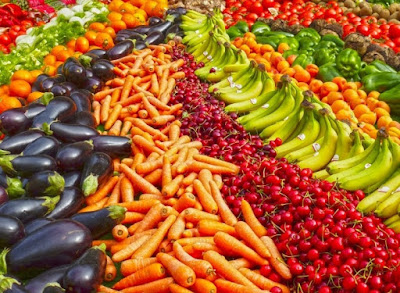Generally, plants are rich in healthy content that the body needs although most times, a lot of us do not consume the recommended amount of fruits...and vegetables we ought to on daily basis, this is an established fact there we ought to ingest a minimum amount of these nutritious foods.
While fruits and vegetables are highly nutritious, rich in vitamins, minerals, fibres, antioxidants and so on, lots of people don’t consume adequate amount on a regular basis. Fibres are important to the body as it is packed with numerous health benefits. Health wise, fibre in-take is good for heart health, blood sugar, waistline, the gut and several others. Many nutritionists believe that eating plant-based foods is more nutritious than animal-based foods.
As mentioned earlier, plant-based diet basically consists of foods made from plants products. These include fruits and vegetables, and also nuts, seeds, oils, whole grains, legumes, and beans.
Hence, Plant-based diet should strictly be based on whole healthy foods, not processed foods.
Beauty & Health Benefits of Plant-Based Diet
- Reduces the risk of heart disease: A recent research published in the Journal of the American Heart Association says that adults who consumed diets high in plant foods and very low animal foods tends to have a lower risk of heart disease and other similar health concerns.
- Prevention and Treatment of Diabetes: Plant-based diets helps prevent and control diabetes by helping to lower insulin resistance and improve insulting sensitivity. A study was conducted in 2009 which consisted of 6,000 people. 2.9 percent of the people who consume plant-based foods were found to have type-2 diabetes and about 7.6 percent of the people that consumed animal-based foods had type-2 diabetes. Basically, non-meat eaters have lower risk of type 2 diabetes than meat eaters.
- Weight Management: Consuming PBD usually have lower body mass index and reduced risk of obesity. Because of the nutrients found in plant-based products: fruits and vegetables such as complex carbohydrates, fibre, high water content, consuming them will make you feel fuller. This will not make you to dwell on binge eating. In addition to the benefits highlighted above, PBD helps to treat obesity. This view is supported by a study carried out in 2018. 75 people were observed and were placed into three categories. Group one were out on PBD, group two were put on PBD and eggs and diary diet while group three were put on regular diet. After four months, the PBD group showed a significant reduction of 14.33 pounds in their weight, the group two also showed reduction while the group three showed no reduction in weight. Thus, using a PBD to lose weight is way more successful compared to other methods.
- Lower risk of cancer: Consuming plant-based foods such as beans, legumes, lentils, fruits, vegetables, seeds, nuts and so on help to reduce the risk of cancer. Phytochemicals present in plants helps to curb cancer.
- Improve Blood Sugar: Animal food is known to increase blood sugar level in the body. The best way to control blood sugar is through fibre consumption. Fibre helps to reduce the accumulation of sugar in the blood stream. It also helps to control cortisol level in the body which helps in reducing stress.
- Help to lower cholesterol: Plants are absolutely cholesterol free. Consuming plant-based foods is one of the best ways to lower cholesterol level in the body. Egg contains high amount of cholesterol and other animal foods as well. But eating plant produce like fruits, veggies, nuts, seeds, whole grains, will help to control cholesterol level to a greater extent.
- Lower High Blood Pressure: Plant-based foods are rich in potassium. Potassium plays major role in reducing high blood pressure which can cause stress and anxiety in the body. Whereas, most of these animal based foods are quite high in potassium and can increase blood pressure.
Nutritional Benefits of Plant-Based Diet
The following are the nutritional benefits of Plant-Based Diet.
- Iron: Plant-based diets are not so iron-fortified compared to animal-based diet. Hence, people undergoing this kind of diet must endure that they include adequate iron in their diet. There are foods that are highly fortified with iron such as:
- Kidney beans
- Soybeans
- Oatmeal
- Cashews
- Black bean
- Cabbage
- Dark leafy greens
- Raisins
- Tomato juice
- Spinach
It is essential to combine both vitamin C sources and iron plant-based products to have a better absorption.
- Omega-3 Fatty acids: This is an essential nutrient in the body. They help to fight and reduce inflammation, help with memory loss, heart disease and so on. The omega-3 components which are EPA and DHA are commonly found in animal-based sources majorly fish, they can also be found in eggs as well. However, there are some plant-based sources that contain omega-3 ALA such as flaxseed, walnuts. But it takes a slow process for the body to convert ALA to EPA or DHA. Therefore, people observing PBD may tend to have lower level of DHA and EPA. This can result into inflammation, memory loss, brain defects and so on. Hence, it’s advisable for people observing PBD to include omega-3 supplement in their diet.
- Vitamin B-12: Vitamin B-12 is vital for better cell function and blood health. Having a low level of this vitamin can result into some health conditions such as anaemia. Vitamin B-13 is lower in plant-based products. It is advisable to take Vitamin B-12 supplement or simply consume foods that are high in this vitamin such as cereals, plant-based milk and others you can find.
- Vitamin D: Vitamin D is essential for bone health, muscle function and for the quick absorption of calcium in the body. Major sources of this vitamin includes fish, fortified milk, with mushroom having a low amount. Vitamin D is often times gotten from the sun and most of us detest sun exposure and will rather spend more time indoor than under the sun. This explains why many people are lacking in vitamin D.
- Calcium: This is another nutritional benefit of PBD. There are some plant-based foods that has adequate amount of calcium such as nuts, seeds, green leafy vegetables. Most plant-based foods have bioavailability of calcium and this so far, has been a huge concern for most dieters.
- Iodine: Typically, most plant-based foods are deficient in Iodine. Iodine is important for better thyroid function. The commonest source of iodine is the iodized salt. Seaweed also has a minimal amount of iodine. And multivitamin supplement that contains iodine can be taken as an alternative.
- Zinc: Zinc is also another nutrient that many plant-based diets lack. Zinc is not easily absorbed from plant-based food and this is because of the Phytate present in these foods. Phytate reduces the absorption of zinc as it usually gets stuck to zinc in the digestive tracts. When zinc is combined with protein, it can be easily absorbed in which, zinc content will be increased in diet.






No comments:
Post a Comment